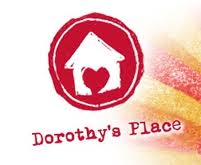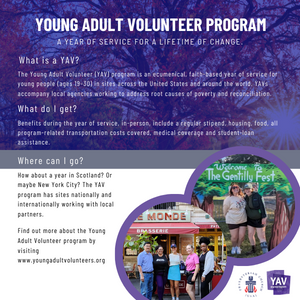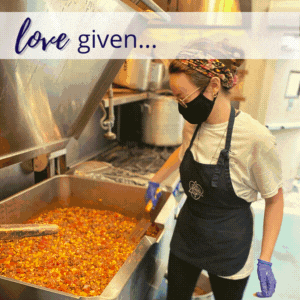 Talia Firpo is a recent graduate from CSU Montery Bay where she majored in Global Studies and minored in Spanish Language. With the intention of being a part of an organization dedicated to loving people and working to overcome social injustices, Talia joined the Companions of the Way, the intentional living community that supports Dorothy’s Place in Salinas, CA.
Talia Firpo is a recent graduate from CSU Montery Bay where she majored in Global Studies and minored in Spanish Language. With the intention of being a part of an organization dedicated to loving people and working to overcome social injustices, Talia joined the Companions of the Way, the intentional living community that supports Dorothy’s Place in Salinas, CA.
“During the day
Anyone can come and play dominoes
Yappy, yelling and loud, conversations abound
Recall that it is a shared space for us all
Outside? Come on in
Out of the cold
Make yourself at home.”
If you’ve ever come by to drop off donations at Dorothy’s and have walked through the Dayroom to get into the donation room, you know what lies inside: too many people, not enough chairs, the scent of coffee and folks inquiring about sugar, the morning news, a passed-around clip-board recording all those who want to do laundry, the polite request of a toothbrush and razor, and bursts of energy.
Dorothy’s Dayroom, named after Catholic Worker Dorothy Day, is a space for people to step off of the streets and into an atmosphere that is quieter, safer and offers various services. We feed people because it brings them in, but really the mission is to listen, love, share and otherwise create relationships with our guests.
The tangible services that Dorothy’s provides are as follows: restrooms, showers, laundry facilities, mail services, use of telephones, and of course, a home cooked meal. The intangible, personal connections are harder to quantify and oftentimes more challenging to bring to life. Other miscellaneous things I find myself doing include giving fashion advice to people trying on clothing in our donation room, calling social workers with questions, playing endless games with guests, braiding people’s hair, organizing birthday celebrations, participating in community forums, and simply sharing stories.

On typical days, the Dayroom opens at 7:00 am and folks are welcomed in with a hot pot of coffee and the morning news. I can sense the mellow energy rising around 8:30 when breakfast is served in the kitchen, adjacent to the Dayroom. After breakfast, we gather with volunteers to do our first cleaning. After a quick sweep, mop and spray down, the real fun begins: from 10am to 1pm (when lunch is served), the Dayroom is used for activities. There is always either a movie or music.

Tables are set up to allow for games and art projects. The guests are accessing services and hanging out. I am making my rounds, saying hi to folks, checking in with specific people, passing out toothbrushes, or petting the street dogs outside. In the afternoon, people who do not have any other mailing address come to the office to pick up their mail, and people begin to line up outside to get some lunch. Following lunch is our final clean-up and closing, and the Dayroom says goodbye to its guests at 2pm until we open up again at 7am the next morning.
On occasion, the ordinary day-to-day activities are punctuated by memorable events. In February, the folks at Dorothy’s Place bid Rachel, a Companion of the Way and staff member, farewell with ice cream, face-paint, the game “Taboo,” and a homemade card. Having something to celebrate, even if it is a little sad, is a great way of generating more positive energy. The monotony of the day was shattered, and reggae music and the delicate art of face painting were the main entertainment. We thanked Rachel for her attentiveness to individuals, her big laughter, her funky dance moves and, most importantly, the love she has spread though conversation and presence.

The mission of the
Franciscan Workers is to live, to love, and to work in harmony to serve the marginalized, to create partnerships that are mutually liberating, and to pursue social justice with respect and dignity for all in the spirit of St. Francis and Dorothy Day. The Franciscan Workers serve the poor in our community through a series of social justice projects centered in personalism and human rights. The Day Room at Dorothy’s Place Hospitality Center is designed to be a gathering place where people who are homeless and marginalized, and others who are our guests can socialize.
 Talia Firpo is a recent graduate from CSU Montery Bay where she majored in Global Studies and minored in Spanish Language. With the intention of being a part of an organization dedicated to loving people and working to overcome social injustices, Talia joined the Companions of the Way, the intentional living community that supports Dorothy’s Place in Salinas, CA.
Talia Firpo is a recent graduate from CSU Montery Bay where she majored in Global Studies and minored in Spanish Language. With the intention of being a part of an organization dedicated to loving people and working to overcome social injustices, Talia joined the Companions of the Way, the intentional living community that supports Dorothy’s Place in Salinas, CA.








 Thousands of faith-based service opportunities can be at your fingertips with the RESPONSE. Download the latest edition today!
Thousands of faith-based service opportunities can be at your fingertips with the RESPONSE. Download the latest edition today!
